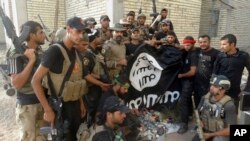Islamic State is “clearly on the defensive and losing ground,” but remains a dangerous threat, says the United States and about two dozen other members of an anti-IS coalition that met Wednesday in Kuwait.
In a joint statement, the Small Group of the Global Coalition to Counter ISIL cited the extremist group’s recent attacks in countries including Belgium, France and Tunisia as evidence of its continued dangers.
“We understand its lasting defeat will require a long, difficult effort,” said the group.
The group, however, said Islamic State had been degraded in other significant ways.
“It has been losing its leaders at a high rate and has lost large numbers of fighters,” it said.
The U.S. interagency delegation was led by Brett McGurk, special envoy for the Global Coalition to Counter ISIL. The Kuwait News Agency said he told the group that coalition airstrikes had been drying up Islamic State resources and had lowered “oil production by at least 30 percent.”
A senior State Department official said the group discussed all aspects of the counter-IS campaign in Iraq and Syria.
In recent weeks, Iraqi forces have made progress in regaining territory seized by Islamic State, but world powers have expressed concerns that political tensions in Baghdad could undermine progress.
On Monday, thousands of Iraqi protesters took to the streets calling for reforms as a divided parliament debated a Cabinet reorganization.
In its statement, the small group said it supports Baghdad’s “commitment to pursue reforms and comprehensive dialogue to achieve inclusiveness and national reconciliation.”
In Syria, a fragile cease-fire is showing signs of fraying, partly due to the Russian-backed Syrian regime’s continued bombing of rebel targets.
“We call for the end of indiscriminate bombing and actions deliberately intended to block humanitarian assistance, for which the Syrian regime bears the primary responsibility,” said the group.
The group last met for a ministerial-level meeting attended by Secretary of State John Kerry in February in Rome. Its next meeting will be in Washington in July.
Progress Cited, Challenges Remain in Fight Against IS




